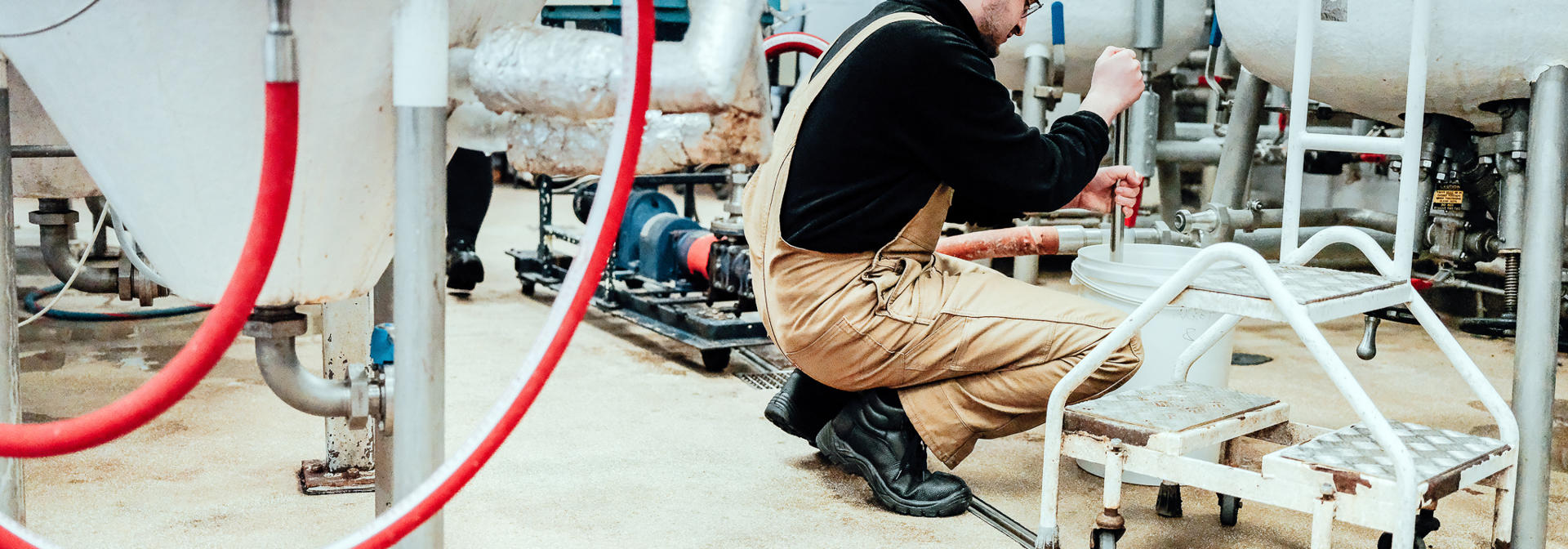Key information
At the forefront of the Brewing and Distilling industry for the UK.
Find out more about our 3 year honours degree option.
- UCAS code
- C980
- Level
- Undergraduate
- Delivery type
- Full Time
- Degree qualification
- BSc (Hons)
- Mode of delivery
- On-Campus
- Duration
- 3-4 years
- Location
- Edinburgh
- Start date
- September
BSc Brewing and Distilling provides you with the unique opportunity to gain a grounding in engineering and science and explore the mechanisms behind brewing and distilling at an undergraduate level. This is the only undergraduate programme of its kind in the UK, in which you can tailor and develop your STEM knowledge, skills, and background to the drinks and beverage industry.
During your undergraduate studies, you’ll learn from a broad curriculum from a wide range of disciplines, including brewing and distilling, biology, process engineering, mathematics, beverage microbiology and biochemistry, food microbiology, bioprocessing, quantitative and qualitative analytical skills, with optional modules in business, accounting and finance, operations management, enterprise, and sustainable development. To develop your brewing and distilling subject knowledge, you’ll explore fundamental topics including, but not limited to, cereal science and technology, yeast science, microbiology, biochemistry, process technology, business studies, management, food safety, quality control and quality assurance, flavour assessment and analytical chemistry.
You will develop a sound basis in fundamental scientific and technological principles and learn to apply this in the context of malting, brewing, and distilling. You’ll explore the underlying principles, relevant defining concepts, theories and methods, the current state of knowledge and future development possibilities of the industries, whilst grasping the global, regional, and local contexts of malting, brewing and distilling. You’ll develop knowledge of policy, legislation, ethical, health and safety issues relating to the design, manufacture, marketing and sale of alcoholic drinks which will provide you with a plethora of knowledge and skills which you can directly apply to various roles in industry upon graduation.
The drink and beverage industry is continuously growing, and is becoming an increasingly important part of GDP. In Scotland alone, more than 11,000 people are directly employed in the Scotch Whisky industry, with a further 42,000 people indirectly employed by the industry. The growing demand for graduates with an understanding of brewing and distilling, will make you highly employable upon completion of the course.
You’ll gain hands-on experience by utilising our on-site brewery, distillery, and rectification laboratory to support your in-depth scientific learning. This will ensure you build the skills and expertise to perform successfully in industry and make you highly employable in all sizes of brewing, distilling and allied industries.
Your student experience
Your learning will be informed by the expertise of our research-active brewing and distilling scientists and academics. Teaching in Brewing and Distilling at Heriot-Watt began in 1903, which led to the establishment of the highly reputable International Centre for Brewing and Distilling (ICBD) in 1989. The ICBD has established itself as an excellent research centre, with close ties with the professional and industrial world of science, engineering, and technology.
The International Centre for Brewing and Distilling is a unique teaching and research facility which meets the needs of the brewing, distilling, and malting industries worldwide. You will learn directly from academics involved in this world leading research, whose work focuses on promoting excellence across five main research themes across the brewing and distilling industries:
- Raw materials
- Malting
- Process improvement
- Sustainability
- Biochemistry and microbiology
Beyond their academic careers, your teaching staff hold various positions of responsibility and authority throughout the industry, including roles on global and local drink companies’ boards and management teams, and on governmental bodies. As a result, your learning will be informed directly by the conversations staff are having both within the university, and outwith in the national and international beverage markets they represent. The teaching staff external roles will further help to improve the industry relevance of the programme, as they will adapt the course content accordingly based on current and predicted industry changes.
The research and industry focused nature of this undergraduate programme ensures your studies remain innovative and up to date with current and emerging trends.
Go Global
There are currently no Go Global opportunities for this particular programme. However, other Go Global opportunities may be available. Please contact studywithus@hw.ac.uk for more information.
Course content
September Intake - Edinburgh
Year 1
Introduces the necessary Biology, Chemistry, Engineering and related topics that are fundamental to Brewing and Distilling.
Mandatory September
- Introductory Biology 1
- Practical Skills in Biology
- Shaping Tomorrow Together A
Mandatory January
- Introductory Biology 2
- Chemistry for the Life Sciences
- Shaping Tomorrow Together B
Mandatory AY
- Introduction to Process Engineering
Year 2
Continues the study of Biological and Chemical Sciences and Engineering and Process Technologies central to Brewing and Distilling while introducing Business Study concepts.
Mandatory September
- Research Methods in Biology
- Science and Exploitation of Plants
- Bioprocess Engineering for Brewing and Distilling A
Optional September
- Management in a Global Context
- Introduction to Accounting
- Mathematics for Scientists 1
Mandatory January
- Introduction to Microbiology
- Cell and Molecular Biology
- Bioprocess Engineering for Brewing and Distilling B
- Industrial Practice for Brewing and Distilling
Year 3
Brings specialist courses in Food and Beverage Process Technology and Biotechnology.
Mandatory September
- Concepts in Beverage Science
- Beverage Microbiology and Biochemistry
Optional September
- Biotechnology
- Introduction to Process Technology
- Food Microbiology and Health
- Sustainable Development and Engineering Management
Mandatory January
- Advanced Industrial Practice
- Bioprocessing
- Research Studies in Malting, Brewing and Distilling
Optional January
- Process Health and Safety
- Operations Management
- Molecular Biology
- Enterprise: Concepts and Issues
Year 4
Focuses on particular aspects of the industry, including: Cereal Technology; Yeast Biology and Fermentation; Beer Maturation; Distillation; Quality; Packaging Technology; and Commercial Aspects of Brewing and Distilling. The School has a pilot plant brewery and distillery, which is used for teaching the practical aspects of the subject through project work. An independent research project allows students to apply their knowledge and skills gained throughout the programme.
Mandatory September
- Advanced Brewing and Distilling 1
- Advanced Brewing and Distilling 2
- Honours Research Project - Execution
- Qualitative and Quantitative Analytical Skills 1
Mandatory January
- Advanced Brewing and Distilling 3
- Advanced Brewing and Distilling 4
- Honours Research Project - Dissemination
- Qualitative and Quantitative Analytical Skills 2
Disclaimer
The courses mentioned above may change between now and the time that you study. For more information, please view our Terms and Conditions.
Programme Video
Study Brewing and Distilling at Heriot-Watt University
Student testimonials
My brewing and distilling degree at Heriot-Watt gave me an end-to-end and deep knowledge of brewing science and technology, centred on current industry needs. Its recognition has helped me in securing and succeeding in my current role as a brewer at Tennents.
Fees and funding
| Status | Fee |
|---|---|
| Scotland | Paid by SAAS |
| England / Wales / N Ireland / Rep of Ireland | £9,790 |
| International | £25,808 |
- Status: Your residency status is usually defined as the country where you have been ordinarily resident for the three years before the start of your course.
- International: 'International' includes applicants from European Union countries who do not hold Pre-Settled or Settled status in UK. (This does not include students from the Republic of Ireland - see above).
Scholarships and bursaries
Bursaries for students from England, Northern Ireland or Wales
In addition to government loans and grants towards the costs of fees and living costs, we are offering generous financial support to attract and support eligible undergraduate students from England, Northern Ireland or Wales:
- Heriot-Watt University Bursary (up to £3,100 per year)
Entry requirements
We have standard entry requirements for all of our courses that you will have to meet.
Year 1
Standard entry requirements
- Highers AABB (over two sittings). Must include Maths and one of Biology, Human Biology or Chemistry, with one required subject at A. OR-
- Highers AABBC (over two sittings). Must include Maths at C, and one of Biology, Human Biology or Chemistry at A.
- A-Levels BBC. Must include Maths and either Biology or Chemistry, with required subjects at BB.
- International Baccalaureate 29 points. Must include Maths and either Biology or Chemistry, with both required subjects at Higher Level 5.
- BTEC Extended Diploma DMM. Must be relevant science subject including sufficient Maths, and Biology or Chemistry.
- HNC A in graded unit. Must be relevant science subject including sufficient Maths, and Biology or Chemistry.
- HND AB / BA in graded unit. Must be relevant science subject including sufficient Maths, and Biology or Chemistry.
- Please check that you meet our University-wide National 5/GCSE (or equivalent) English and Maths requirements.
Minimum entry requirements *
- Highers BBBC (over two sittings). Must include Maths at C and B in one of Biology, Human Biology or Chemistry.
- A-Levels BCC. Must include Maths and either Biology or Chemistry, with one required subject at B.
- International Baccalaureate 28 points. Must include Maths and either Biology or Chemistry, with both required subjects at Higher Level 5.
- BTEC Extended Diploma MMM. Must be relevant science subject including sufficient Maths, and Biology or Chemistry.
- HNC B in graded unit. Must be relevant science subject including sufficient Maths, and Biology or Chemistry.
- HND BB in graded units. Must be relevant science subject including sufficient Maths, and Biology or Chemistry.
*Minimum: under our Fair Access Policy, we will relax our standard entry requirements for some Scottish and Rest of UK status students depending on their circumstances. Our minimum requirements will apply if you:
- live in an area within the Scottish Index of Multiple Deprivation lowest 20% (SIMD20) or POLAR4 Quintile 1 regions (RUK)
- or are care experienced.
We can also make exceptions for some Scottish students with grades above minimum but below standard. Read more about our Minimum and standard entry requirements.
Year 2
- Advanced Highers AB. Must include Advanced Higher Biology and Maths plus meet Y ear 1 Higher requirements (with essential subjects including Chemistry.)
- A-Levels BBB to include Maths and either Biology or Chemistry.
- International Baccalaureate 34 points. Must include Maths and Biology at HL 6 and Chemistry at HL 5.
- BTEC Extended Diploma: DDD. Must be in relevant science subject including sufficient Biology, Chemistry and Maths.
- HNC: not available.
- HND AA or AB / BA (Access Threshold Eligible only). Must include sufficient Biology, Chemistry and Maths.
Year 3
Entry to Year 3 is only available via our associate student partnership college route.
Additional information
- For all years, applications are welcomed from holders of non-school qualifications, mature candidates and overseas students.
- If you do not see your qualifications here please contact us at studywithus@hw.ac.uk
- For applicants studying HNC, HND or BTEC qualifications, when submitting your application please ensure you list in full all the units you are currently studying, as specific units (e.g. in Maths) may be required.
English language requirements
If your first language is not English, we'll need to see evidence of your English language ability.
The minimum English language requirement for entry to this programme is IELTS 6.0 (or equivalent) with no score lower than 5.5.
If you do not have IELTS 6.0, we offer a range of English language courses to help you meet the English language requirement for this programme prior to commencing your studies.
Please see our detailed English language requirements.
Why Heriot-Watt
We're the top university in Scotland for graduate outcomes which means that more of our graduates are employed or in postgraduate education than any other institution in the country and we ranked 5th in the UK.
We're also rated number one in the UK for CEO or MD roles, meaning more of our graduates go on to become CEOs or MDs than any other university in the whole of the UK. On top of that, we have beautiful campuses, across the globe, so you'll get a truly international education. Our Edinburgh Campus is home to Oriam, Scotland's National Sports Performance Centre combined with plenty of wellbeing resources, prioritising fitness and mental health for all students. Our Global Research Institutes look at solving real world issues such as climate change and saving our oceans as well as working on the next medical technological breakthrough and the future of AI and robots.
Employability
Work and study
Student life
Explore facilities, and chat to staff and students
Discover Uni course data
Discover Uni provides data on each university's degree courses across a range of measures including student satisfaction, graduate jobs and salaries.






